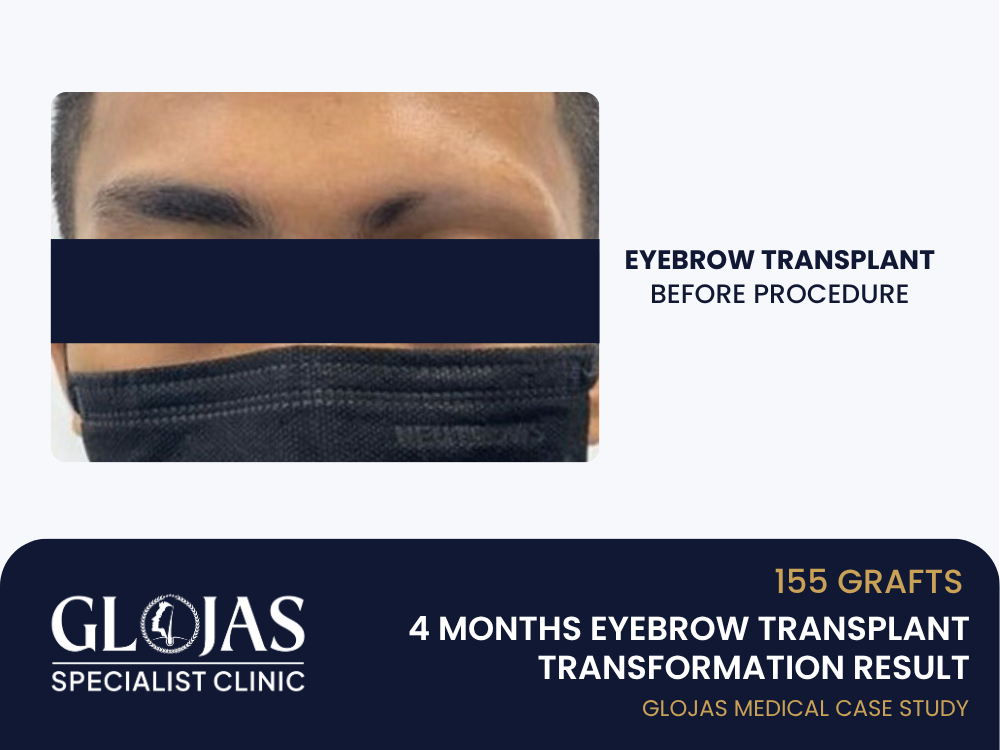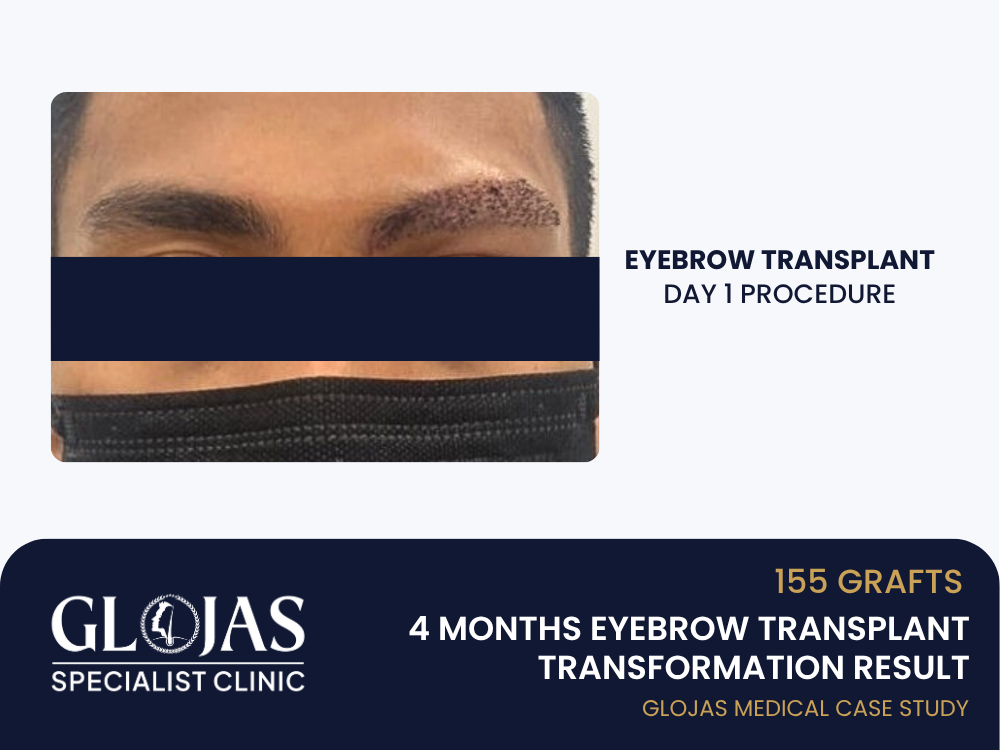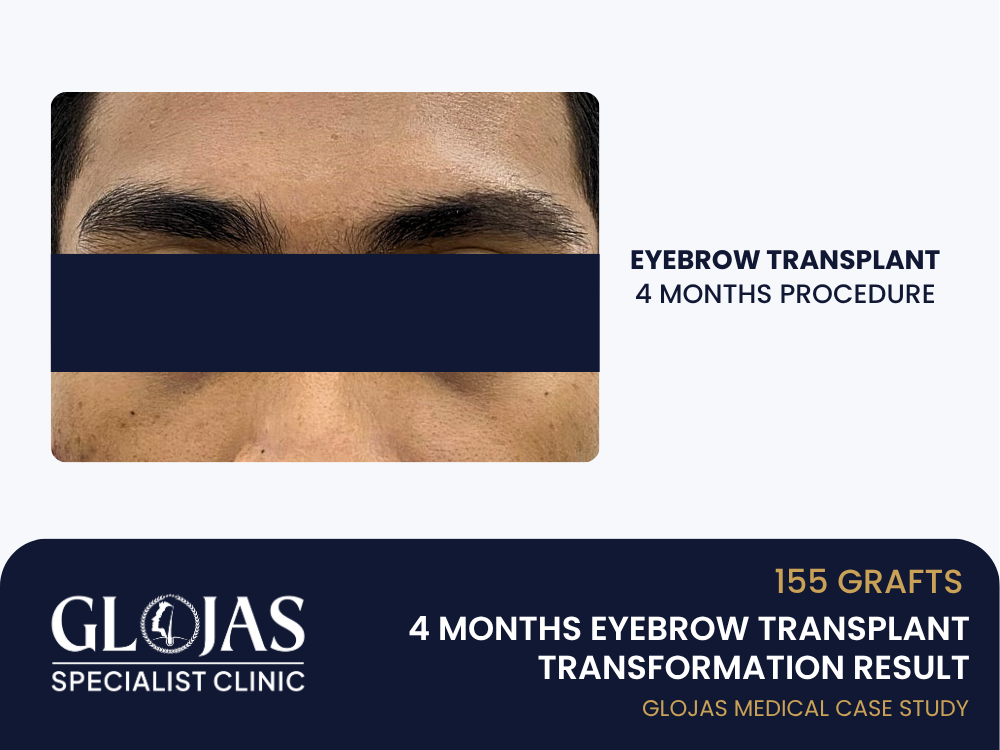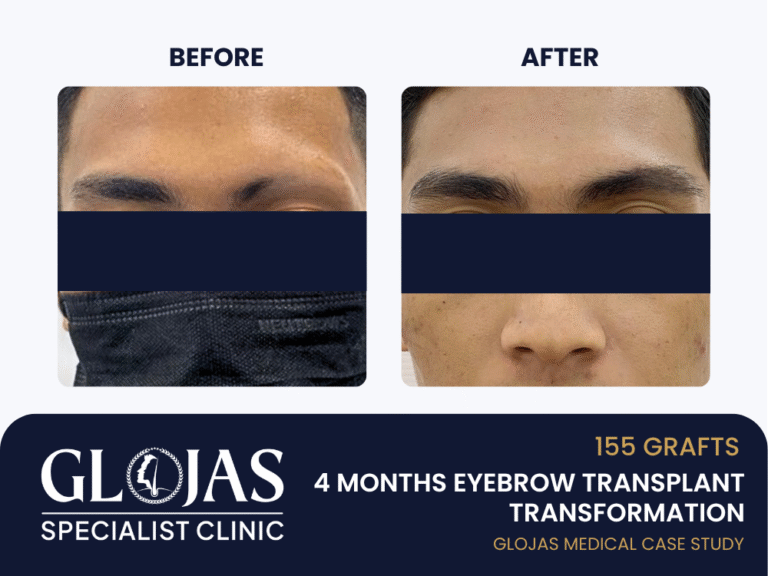Eyebrows are a key facial feature — even more so for men, where strong, defined brows with eyebrow transplant can frame the face and influence expressions. But when a traumatic injury causes scarring in the eyebrow region, not only does it affect appearance, but it also affects self-confidence.
This case study highlights the journey of a 34-year-old male who underwent a SMART™ FUE Eyebrow Transplant to address a noticeable scar on his right eyebrow, caused by a chemical burn at work. Just 4 months after the procedure, he achieved significant coverage and restored facial symmetry, with minimal downtime and a natural finish.
Patient Background
Name: Mr. B (identity withheld for privacy)
Age: 34
Gender: Male
Main Concern: Visible scar with no hair growth across the middle of the right eyebrow
Cause of Injury: Chemical splash accident during industrial work
Desired Outcome: Reconstruct and blend the scar area with natural eyebrow hair
Before surgery, Mr. B had to fill in the scar with pencil or simply tolerate the imbalance in his facial expression. He wanted a permanent and low-maintenance solution.
Initial Consultation & Assessment – Eyebrow Transplant
During his consultation, Mr. B was evaluated by a hair restoration specialist. The key aspects of the consultation included:
Scar assessment: Stable and mature with good vascularity
Donor area: Back of the scalp — healthy and suitable for harvesting
Skin type: Medium-fair, with no signs of keloid history
Eyebrow design: Restore the natural line, thickness, and hair angle over the scar
After thorough examination, it was determined that 155 grafts would be sufficient to fill and soften the scar zone while maintaining a masculine eyebrow shape.
Why SMART™ FUE for Eyebrow Scars?
SMART™ FUE (Scalp Micro-Advanced Restoration Technique) is an ideal method for eyebrow transplant, especially in scarred areas. It offers:
High graft survival rate even in scar tissue
Micro-precise follicle placement for natural direction
No linear scarring
Minimal trauma to the surrounding skin
Suitable for delicate facial zones
This technique increases the chance of success when transplanting hair into previously damaged or scarred skin, making it optimal for Mr. B’s case.
Procedure Summary

Duration: 3 hours (outpatient)
Grafts Used: 155 (mostly single-hair follicles)
Donor Site: Occipital scalp (back of head)
Recipient Site: Mid-section of the right eyebrow (scarred area)
Step-by-step:
Local anesthesia was applied to both donor and recipient sites
155 grafts extracted using a fine 0.7 mm punch tool
Grafts sorted under a microscope, prioritizing single-hair units
Micro-incisions are made along the scar to match the hair direction
Grafts inserted at shallow angles to replicate natural brow flow
Mr. B remained comfortable throughout and returned home the same day.
Post-Procedure Recovery

Days 1–3: Slight redness and swelling over the brow
Days 4–7: Tiny scabs formed; patient instructed not to pick
Week 3: Some transplanted hairs shed — expected part of shock loss phase
Months 2–3: Early regrowth appeared, blending with native eyebrow hairs
Month 4: Visible filling of the scar, with natural shape forming
4-Month Results

By the fourth month, Mr. B experienced noticeable improvement in symmetry and scar camouflage.
| Feature | Before | After 4 Months |
|---|---|---|
| Mid-brow | Smooth, bald scar across brow line | Filled with new hair growth |
| Brow Symmetry | One side is broken, patchy | Balanced, natural contour |
| Maintenance | Needed daily pencil | None – just light trimming |
| Confidence | Avoided eye contact | More expressive and at ease |
Patient Feedback
“For years, I didn’t realize how much that little scar affected how I looked — and felt. This transplant gave me back something I didn’t know I was missing.”
Mr. B was particularly impressed that the new hairs followed the same growth direction, and the scar had become nearly invisible.
Long-Term Maintenance
Light trimming every 2–4 weeks to maintain brow length
Results are permanent, as transplanted hair follicles are rooted in
No further treatment needed unless desired for density boost
The scar remains covered unless shaved
5 Frequently Asked Questions (FAQ)
1. Can hair grow on eyebrow scars?
Yes — if the scar is mature and has a blood supply, techniques like SMART™ FUE can successfully regrow hair in those areas.
2. How many grafts are needed for an eyebrow transplant?
It depends on the size of the area. For small scar zones like Mr. B’s case, 100–200 grafts are often enough. Full brows may require 250–400.
3. Will the hair match the natural eyebrow?
Yes. The donor hair is chosen based on texture, and precise placement ensures it grows in the same angle and direction as natural brow hair.
4. Will I need touch-ups?
Not always. However, some patients choose a small density boost after 12 months for perfection, especially in scarred areas.
5. Is the result permanent?
✅ Yes. Once healed, the transplanted follicles are permanent, though hair may need occasional trimming, just like your natural brows.
Final Thoughts
This case demonstrates how SMART™ FUE eyebrow transplant can effectively treat even complex cases involving scarring and facial trauma.
With just 155 grafts and 4 months of recovery, Mr. B regained a balanced, natural eyebrow line that restored not only his appearance, but also his comfort in his own skin.
If you’ve suffered an injury, burn, or scarring that affected your brows, this procedure could offer a permanent, natural solution with minimal downtime.
